JERICHO, New York — The last time a bar or bat mitzvah read from the Torah at the Jericho Jewish Center was well before COVID-19. It’s been at least four years since a full-time cantor sang from the Conservative Long Island synagogue’s pulpit. And except for Shabbat, it no longer supports morning prayers.
These are perhaps the starkest examples of how the center, known as JJC, has changed over the last 25 years. It’s also why the majority of the synagogue’s members believed consolidating with the nearby Conservative Woodbury Jewish Center was the key to saving it.
Yet, although an overwhelming majority of congregants favored the plan, the merger between the two Conservative synagogues, located a mere five miles apart, failed.
On June 22, after 20 months of negotiations, a two-thirds majority of the synagogue’s board voted to dissolve the 60-year-old synagogue and give the proceeds to charity. The vote left congregants angry, surprised and saddened. But the story didn’t end there.
On August 3, a new board voted to postpone the dissolution, leaving the synagogue’s future in limbo. No new vote has been scheduled.
Get The Times of Israel's Daily Edition by email and never miss our top stories
At least 20 members have already left to join the Woodbury Jewish Center exacerbating an already serious issue with funding. Additionally, Rabbi Matt Abelson, who had signed on to lead the congregation in 2019, took a new position at pro-Israel nonprofit StandWithUs following the vote.
“Over the last two years, I was often quite desolate and quite upset not just for myself, but for the congregation,” Abelson said.
The fate of JJC might be attributed to changing demographics, declining membership, the lingering effects of the coronavirus pandemic or differing views as to the role of a synagogue. However, one thing is clear: What happened at JJC reflects the many changes taking place within the American Jewish community.
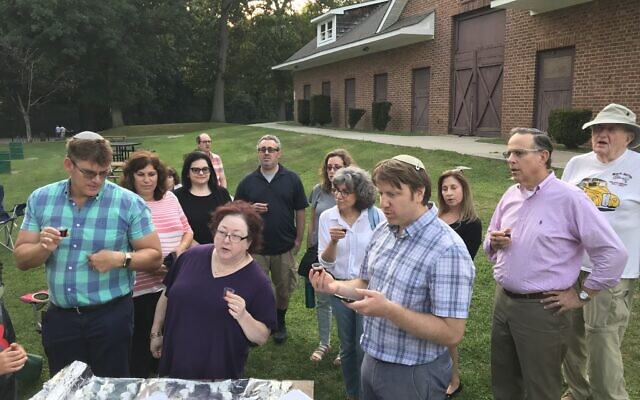
Rabbi Matt Abelson, fourth from right, celebrated Shabbat in the park with the Jericho Jewish Center. (Leslie Hartman)
Studies show the number of unaffiliated US Jews growing, forcing congregations to compete for a dwindling pool of possible members.
According to a 2021 Pew Research Center study, while 17 percent of American Jews said they were raised with no particular denomination, 29% identify as such today. Among American Jews under the age of 30, more than four in 10 are unaffiliated, the survey found.
The squeeze is particularly acute for Conservative Judaism. The study found that while 25% of US Jews were raised in the Conservative movement, only 15% identify as Conservative today.
By contrast, the Reform movement is growing. Whereas 28% of US Jews said they grew up in the Reform movement, 33% of US Jews currently identify with it.
“In general, younger American Jews have multiple identities and don’t always identify based on ‘denominational’ labels,” suggested Rabbi Jacob Blumenthal, Joint CEO of United Synagogue of Conservative Judaism and the Rabbinical Assembly. “They grow up in our congregations, attend our Ramah camps, and feel closely connected to Judaism, but don’t always limit themselves to a denominational label.”
More than one-third of Conservative synagogues and an estimated one-in-five Reform synagogues have closed in the past two decades, according to the Pew study. Others have looked to partnerships, with some congregations even partnering with Orthodox organizations such as Chabad to stay open.
“Our movement will continue to help synagogues grow and thrive. However, emerging and young adults are not necessarily drawn to synagogue life, and we will look for new ways to engage them online and through in-person engagement,” Blumenthal said.
Portrait of a synagogue as a young institution
The Jericho Jewish Center website describes the congregation as a “friendly progressive Conservative synagogue” founded in 1956, at the tail end of a short-lived real estate development boom. The suburban, upper-middle-class hamlet on Long Island’s north shore is quiet, with a population of around 15,000. It’s also getting older — the median age in Jericho in 2020 was 46, compared with the United States median of 38.
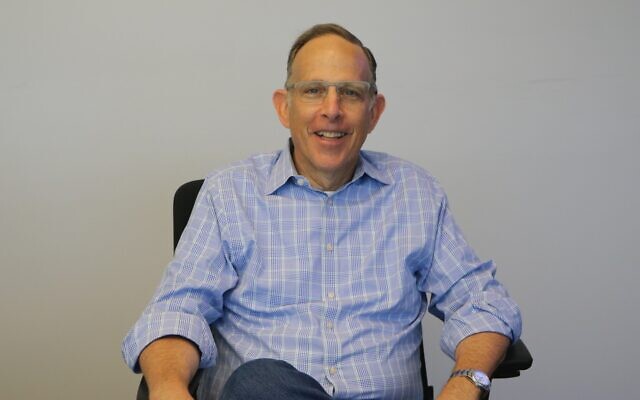
Jay Sherman, former president and member of the consolidation exploratory committee at the Jericho Jewish Center. (Courtesy)
When former synagogue president Jay Sherman and his wife joined JJC in 1997, he said they were attracted by its “large, robust congregation,” and style of worship, he said.
“Over the past couple of decades, we’ve seen a significant change in the demographics of the Jericho community,” said Sherman, who also previously served as a trustee. “We used to have as many as 600 family units, we now have a fraction of that. We no longer have a religious school because we don’t have young Jewish families moving into the Jericho community.”
JJC isn’t an outlier in this regard. Only one-in-five American Jews attend religious services once or twice a month, according to the 2021 Pew Research Center study.
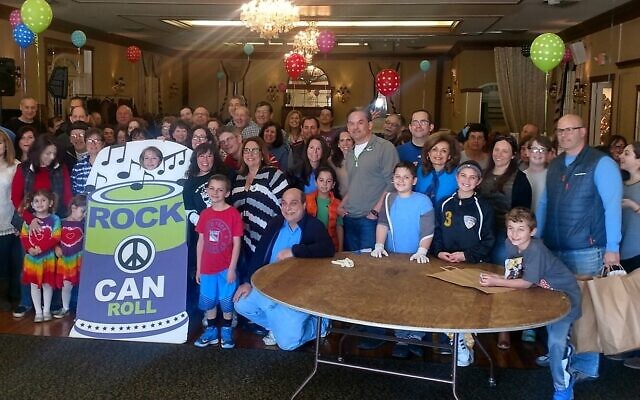
Congregants at the Jericho Jewish Center gather for an event in this undated photo. (Courtesy)
COVID-19 also played a role in challenging JJC’s long-term viability, Abelson said.
“We experienced attrition through death and also people dropping off during the pandemic. And I think that’s what motivated leadership to seek this option. I must have done 40 funerals in two years. It was extreme. People were dying. We’re not having simchas and there were very few b’nai mitzvah,” Abelson said, using Hebrew terms for celebrations.

A celebration with a Torah at the Jericho Jewish Center in this undated photo. (Courtesy)
When it became clear a plan was needed to save JJC, Abelson thought it made sense to explore a consolidation with Woodbury Jewish Center, also known as WJC.
“The reason I was so in favor of the consolidation is because I feel that most places in the country, their best chance is to merge outside of their movement, and here we could merge inside our movement,” Abelson said.
The path to dissolution
In September 2020, the synagogue’s leadership formed an exploratory committee to look into consolidation. A memorandum of understanding, which has since expired, was signed between JJC and WJC.
An internal survey showed that 76% of JJC members favored a merger, said Sherman, who served on the committee.
“We viewed the opportunity to consolidate and create a new congregation as a means to build a robust, Conservative congregation on the North Shore of Long Island that would appeal to multiple parts of the Jewish community,” Sherman said.
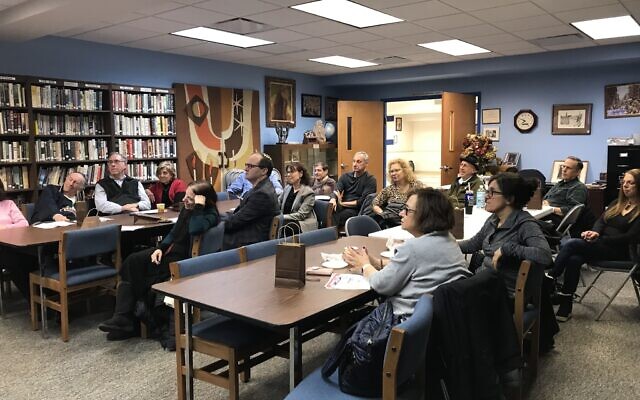
Congregants of the Jericho Jewish Center in the synagogue library. (Leslie Hartman)
Many of those who were opposed were turned off by WJC’s more egalitarian approach to services, preferring JJC’s tradition of men and women worshiping in separate seating. They also opposed the idea of women clergy — despite the fact that the Conservative movement ordained its first female rabbi in 1985.
Throughout 2021 and up until the first June vote, the exploratory committee and WJC continued to work to try and find a solution. At one point the WJC offered to create a second minyan that would follow JJC ritual practices. Then, nearly one year into the negotiations, the WJC rejected the idea of a second minyan.
At that point, the traditionalists asked if JJC would “carve-out” some of the proceeds from the sale of the synagogue to help them maintain their own independent prayer quorum in Jericho.
That effort also failed, causing tensions to flare in the ensuing weeks. One member threatened litigation in early 2022, the committee chairs resigned, the memorandum of understanding expired and the plan was permanently derailed.
On June 8, two weeks before the JJC voted to dissolve, WJC president Dr. Ellen Feit sent an email to JJC members to “express… extreme sadness that our potential consolidation is not proceeding.”
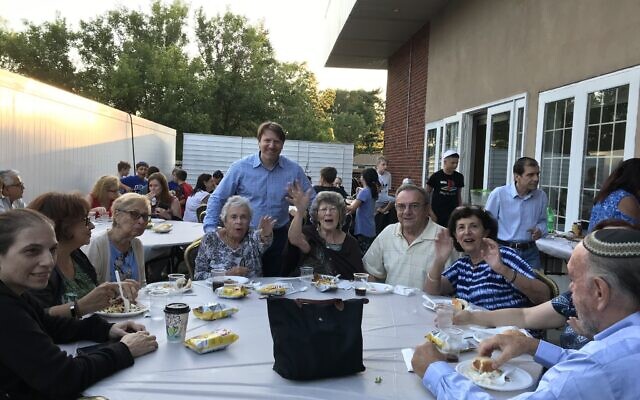
Congregants of the Jericho Jewish Center celebrate Shabbat in the park in this photo from 2019. Rabbi Matt Abelson is standing, center back. (Leslie Hartman)
In her email, Feit said she considered consolidating as an opportunity to build a united and strong Conservative synagogue. Feit declined to comment further, saying there were still ongoing discussions.
On June 16, a week before the fateful vote, another email circulated among congregants. Signed by JJC board member Daniel Krieger and “a core group of 50 JJC congregants” who wished to remain anonymous, this email said the consolidation efforts collapsed for a myriad of reasons, including the carve-out issue. It also implored congregants to renew their memberships.
Krieger declined to comment further.
Next steps
When the synagogue voted to dissolve in June, the institution had intended to donate the sales of its assets to various non-profits, including the Jewish Theological Seminary, the Jewish National Fund, United Synagogue of Conservative Judaism, Yad Vashem and the Holocaust Memorial and Tolerance Center of Nassau County.
That plan is now on hold.
As the synagogue’s final chapter is yet to be written, Sherman said people need to understand that in spite of everything, there are plenty of places where Conservative Judaism is not just surviving, but thriving.
“While declining membership is true in many instances, I’m aware of many successful congregations in Nassau County that are close to bursting at the seams,” he said. “I think part of it is listening to your members or listening to your community, or listening to your prospective members.”


